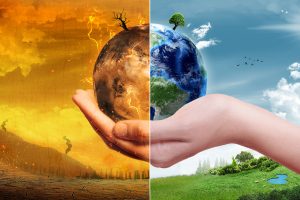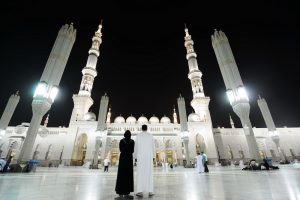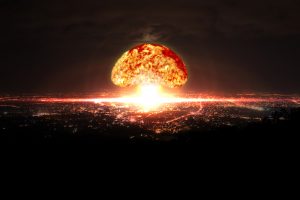
Fazal Ahmad, UK
2020 saw a sudden upturn in fears of climate catastrophe, fears of extinction of species, growth in plastic and other pollution and the erosion of natural habitats resulting in wildlife encroaching more on human settlements. Then the onslaught of the COVID-19 pandemic began that has now resulted in almost 2.5 million deaths. Is this a coincidence or are these events linked?
The Holy Qur’an describes how flimsy the spider’s web is in the context of disbelief:
‘The case of those who take helpers beside Allah is like unto the case of the spider, who makes for herself a house; and surely the frailest of all houses is the house of the spider, if they but knew!’ [1]
Our natural ecosystems across the planet are just as fragile as the spider’s web. The seas, forests, rivers, mountains and other habitats each survive on a delicate balance based on climate and a deliberate hierarchy of life forms that were carefully designed. But as humans erode the forests and pollute the oceans and cull certain wildlife, birds and sea creatures, this is creating a dangerous imbalance in those ecosystems leading to many creatures becoming extinct and climate change. Where ecosystems such as forests are destroyed, the wildlife that survived there are now entering uncharted territory including our towns and cities, trying to find a new way to exist and survive, and coming into much closer contact with humans. Yet the Holy Qur’an beautifully describes the communities of wildlife:
‘No creature is there crawling on the earth, no bird flying with its wings, but they are nations like yourselves.’ [2]
How sad that we are responsible for disturbing those nations of creatures to such an extent that many creations are now extinct, and future generations will never be able to enjoy them.
Extremes of weather are becoming more common, and gradually many ecosystems, such as the Great Barrier Reef, are disappearing leading to unintended consequences. Even where oceans continue to support life, we should be ashamed of the extent to which our plastic and other pollution is destroying the natural environment.
The time has come to realise that the rich natural habitats that we have enjoyed for many millennia are under threat due to our behaviour, and just are as fragile as the spider’s web. In being careless with our environment and disrespecting the creations that Allah has provided for our benefit, we are doing harm to the planet and also to ourselves, both physically and spiritually.
Understanding our responsibility to the planet is something that people of all faiths are aware of:
- ‘This earth is a garden, the Lord its gardener, cherishing all, none neglected’ (Sikhism). [3]
- ‘Have benevolence toward all living beings’ (Jainism). [4]
- ‘Even in a single leaf of a tree, or a tender blade of grass, the awe-inspiring Deity manifests itself’ (Shintoism). [5]
The last 12 months have shown that even through lockdown, and with drastically reduced travel, we are still able to survive. This is still in our control, and if humans reflect and change their behaviour, then we can help restore some of the balance on our planet.
COVID-19 has also shone a spotlight on our behaviour towards each other. We need to take more care of personal hygiene to protect each other, something which has been given precedence by Islam for over 1400 years. Equally, as we roll out vaccines, the greed of some nations to hoard vaccines for themselves is now an issue, as if people in low-income regions are not given equal access, we will all be prone to greater virus mutations and risk, and the impact on those societies will have an impact on trade and security for all nations. There is enough arable land in the world to easily feed the human race, but it requires us to show justice to all and reduce our greed.
Now in 2021, we stand at a threshold. We can make the right directions and bring a semblance of balance back to our planet, or if we continue with our current behaviour, the consequences are now crystal clear for everyone to see.
About the Author: Fazal Ahmad is the Editor for the ‘World Religions’ section of The Review of Religions. He also serves as the Global Operations Director with Humanity First, and is responsible for poverty alleviation projects in 54 countries, mainly in Africa, South Asia and Central America.
ENDNOTES
[1] The Holy Qur’an, 29:42
[2] The Holy Qur’an, 6:39
[3] Adi Granth, Majh Ashtpadi 1
[4] Tattvarthasutra 7.11
[5] Urabe-no-Kanekuni




Add Comment